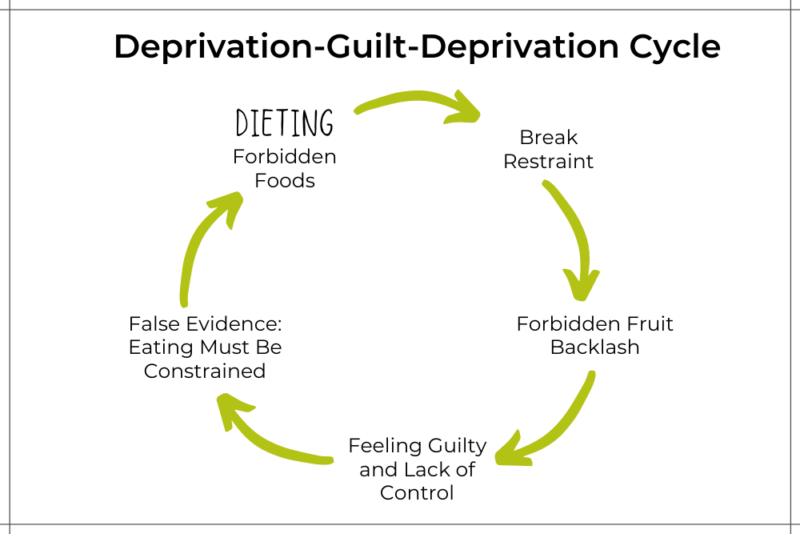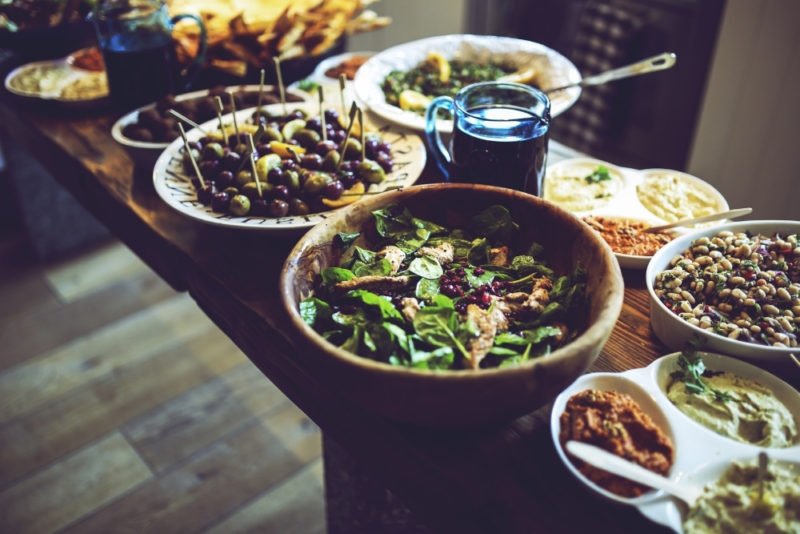
This time of year, it’s easy to slip into food-restriction mode, whether because you feel like you “overdid it” during the holidays (or the past nine months), or because all that “New Year, New You” marketing BS from weight loss companies is seeping into your brain.
But restricting your food based on external (and often arbitrary) rules isn’t good for physical or psychological health and well-being. In case you doubt me, here are five reasons why you should opt for food peace instead:

1. The deprivation-guilt-deprivation cycle
When you restrict your food — whether that means cutting calories or banishing specific foods or food groups — that sets you up for a wicked backlash. That a bitter irony, because it’s common to feel that if you don’t have food rules, that your eating will be totally out of control, but it’s really the food rules and restrictions that create the conditions for out-of-control eating to bubble up.
You go on a diet (or “wellness plan”) that restrictions certain foods, making them forbidden. At some point, your restraint (or willpower) breaks, causing backlash or rebound eating of forbidden foods (because forbidden fruit tastes the sweetest). This causes you to feel guilty and lacking in control and serves as false evidence that you must constrain your eating (because clearly you can’t be trusted), so you redouble your efforts to restrict…and the cycle begins anew.
That’s why I teach people how to practice Intuitive Eating. Intuitive Eating uses internal hunger, fullness and satisfaction cues to guide eating — but not in a rules-based way. In other words, this isn’t the “hunger-fullness” diet. By tuning in to what your body is telling you about when you need to eat, how much you need to eat to feel comfortably full and satisfied and what types of food will hit the spot and leave you feeling good and energized, you have gentle guidance that’s more valuable than any set of rules could be.

2. A varied diet optimizes nutrition
American eaters already don’t get enough of several key nutrients. When you restrict calories or food groups, it makes it even harder to get the array of vitamins, minerals, antioxidants and phytochemicals we need for good health.
Perhaps not surprisingly, research demonstrates that intuitive eaters tend to have more varied and nutritious diets than the general population. Most of my private clients are learning to become intuitive eaters (so they can get off the yo-yo dieting treadmill and shed the mantle of diet culture), I also work with clients with irritable bowel syndrome (IBS) who want to learn how to eat to avoid triggering their uncomfortable and sometimes embarrassing digestive symptoms. While part of that process involves an elimination diet, the goal is to hone in on which foods are actually causing problems so we can reintroduce as much variety back into the diet, as soon as possible. Restriction can take many forms, and happen for many reasons, but removing as many restrictions as possible is key to a healthy diet.
3. Allowing all foods increases food enjoyment
Unless you’re allergic or intolerant to a certain food — or just truly don’t like it — allowing all foods the opportunity to have a place at your table not only increases nutrient variety, but it increases variety in terms of taste, texture and other sensory aspects. And that increases food pleasure.
Food is supposed to be pleasurable — we are literally wired that way. That’s why one important Intuitive Eating principle is “Make Peace With Food.” This principle is all about allowing ourselves unconditional permission to eat, including eating what pleases our palates. No, that doesn’t mean a food free-for-all (i.e., it’s not eating whatever you want, as much as you want, whenever you want, without regard to hunger and fullness). Intuitive eaters eat for pleasure and satisfaction, but they also eat in a way that leaves them feeling good when the meal is done. That means choosing foods (and amounts of foods) that leave you feeling nourished and energetic, not sleepy and stuffed.
Again, this contributes to intuitive eaters having more varied and nutritious diets. Even thought they could eat nothing but cookies all day if they really wanted to (because, food peace), they don’t want to. Not only would that not leave them feeling great, but they know they can have a cookie anytime they really want one, which removes the allure of the forbidden food. Truly, many of my clients get a little sad when the excitement of re-introducing previously forbidden foods wears off. After a while, a cookie is just a cookie, and you realize that sometimes you actually are craving a salad.

4. Removing restrictions enhances the social aspects of eating
Have you had a friend or family member tell you, “I can’t got to that party/can’t go to that restaurant with you because it doesn’t fit with my new diet…there’s nothing there that I can eat”? Have YOU been that person? Part of finding the joy in food is breaking bread with others — whether literally or figuratively. So making peace with food helps you increase joy when you’re alone, and increase opportunities for finding joy with others.
When your dietary restrictions (perhaps strengthened by food fears) mean you have a difficult time eating anywhere but at home, that can lead to social isolation, and social connection is an important contributor to health! People who have serious food allergies or celiac disease face this dilemma because they have foods they have to avoid unless they want to risk harming their health, but that’s not the case for the rest of us. Again, that’s why when I’m working with my IBS clients, I want to help them figure out what foods they need to avoid as soon as possible so they aren’t avoiding other foods unnecessarily.
(An important note: Eating foods that trigger IBS symptoms like diarrhea and abdominal pain and bloating isn’t actually causing damage, so IBS sufferers could choose to eat a triggering food if they really miss it. That’s not the case with food allergies and celiac disease.)
5. Increasing food variety increases quality of life
Food restriction can become obsessive — I know, because I’ve been there, and there’s no getting that time back. It also doesn’t feel good to be worrying about what you’re eating, how much you’re eating, what you’re “allowed” to eat for lunch based on what you decided to eat for breakfast. When food rules lead to food fears, the brain drain is even worse.
And if food restriction leads to bingeing, with its physical discomfort layered with guilt and shame…yeah, there’s very little quality of life there. Many of my clients can attest to that. It’s easy to think that food peace is about as elusive as unicorns, but that’s just not the case.
Disclaimer: All information provided here is of a general nature and is furnished only for educational purposes. This information is not to be taken as medical or other health advice pertaining to an individual’s specific health or medical condition. You agree that the use of this information is at your own risk.
Hi, I’m Carrie Dennett, MPH, RDN, a weight-inclusive registered dietitian, nutrition therapist and body image counselor. I offer compassionate, individualized care for adults of all ages, shapes, sizes and genders who want to break free from eating disorders, disordered eating or chronic dieting. If you need to learn how to manage IBS symptoms with food, or improve your nutrition and lifestyle habits to help manage a current health concern or simply support your overall health and well-being, I help people with that, too.
Need 1-on-1 help for your nutrition, eating, or body image concerns? Schedule a free 20-minute Discovery Call to talk about how I can help you and explore if we’re a good fit! I’m in-network with Regence BCBS, FirstChoice Health and Providence Health Plan, and can bill Blue Cross and/or Blue Shield insurances in many states. If I don’t take your insurance, I can help you seek reimbursement on your own. To learn more, explore my insurance and services areas page.






